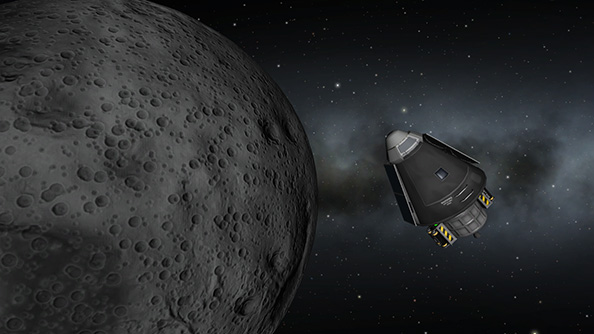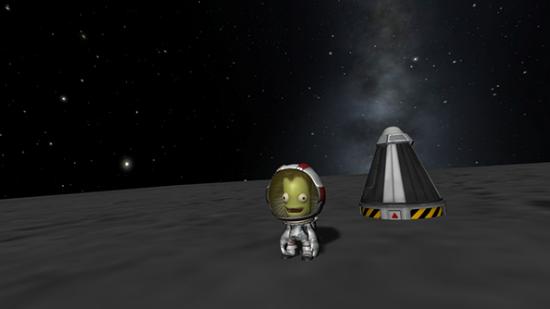Everybody loves space. All those planets and black holes whizzing around, orbitting things and getting into scrapes. All the tinfoil spaceships we’ve sent out to look for interstellar treasure. Those screaming cats and dogs we were sending up in rockets for a while. They must have been especially excited about the wonders of the universe. Yes, it’s round the clock, cosmic fun wherever space is concerned, and videogames are certainly no exception.
The indelible Kerbal Space Program is one such space videogame. It recently received its huge First Contract update, which is not only a tremendous pun but a comprehensive overhaul of the game’s fledgling career mode and an update that’s been years in the making. What was once a sandbox free-for-all ship builder is now a sort of aerospace tycoon game in which you take on government and private contracts in order to raise cash and progress along a branching tech tree. I’ve been playing it. Here’s what I think so far.
Kerbal Space Program definitely benefits from its newfound sense of hand-holding and direction, even in this early introduction to contracts. While you can still choose to play in the game’s classic sandbox mode, in which you have the entirety of the tech tree available from the outset, it’s the new career mode and its guiding restrictions that now form the most beguilingly science-y facet of the game.
You start out with just a handful of the most basic rocket parts: a bulky one-man capsule, a solid rocket booster, a liquid fuel engine, a parachute. These are the barebones tools of the trade, just enough for most players to touch the sky and fall back down to the planet Kerbin again.

As you carry out contracts you’ll be rewarded in three ways. You’ll get science, which is a special currency you can use to unlock new parts on the tech tree. You’ll get money, which you use to actually build your ships. And (assuming you don’t crash and murder any poor kerbonauts) you’ll get reputation, which increases the value of the contracts being offered to you.
On the Mission Control screen you’ll find a list of available contracts to choose from. These come in several types too. Most ask that you test certain new rocket parts under very specific conditions, such as triggering a decoupler somewhere in the upper atmosphere while flying at high speed. Others are randomly generated based on your current situation. For instance, you might be sent back up to space to rescue a Kerbin you’d left behind on a previous mission.
Otherwise you’ve also got milestone contracts to shoot for, which hang around until you manage to complete them. These contracts push you towards your next achievement: from setting a new altitude record, to orbitting Kerbin, to reaching and landing on the moon.
It’s such a trivial change, adding these commercial nudges you towards objectives, but it makes a huge difference to your approach to constructing new ships. Parts testing will have you bolting together strange contraptions you’d never normally find yourself using in sandbox mode. In one mission you’ll be trying to haul an entire solid rocket booster into a sub-orbital trajectory at 80km, just to see what happens when you fire it off. In another you’ll be attempting to safely submerge a giant engine into Kerbin’s ocean, to see if it works when filled with gallons and gallons of salt water. Contracts can turn ship parts into unique cargo objects that must only be deployed or fired once all conditions have been met.

It doesn’t always work. A few of the generated contracts ask you test out a part “while landed”, which involves simply bolting the part on to a capsule, triggering it on the launch pad without going anywhere and collecting your earnings for a job well done. Hardly the Apollo mission. And while the punishment for failing to complete a contract in time or intact is a small loss of earnings, judicious use of quicksaves and quickloads turns much of what you’re asked to achieve into a matter of trial and error. Conversely, the step up in difficulty between that and switching off quicksaves is disgustingly punishing.
The bits of your ship that you safely manage to return to Kerbin’s surface can now be converted back into cash, depending on how much of it survives and how near to the launch site you can land it. Again, this isn’t quite a perfect system yet. You can’t stick parachutes on your boosters or other often disposed of parts to send them safely sailing back down into the ocean, simply because of how the game engine handles objects that are too far away to be simulated.
The cost of those parts will nearly always be lost in every mission. But by and large you’ll be hoovering up huge amounts of money with each successful contract anyway, enough that you can plough your expensive ships into asteroids all day long and barely notice the change in your bank balance. Cash rarely becomes a concern, at least in this version of First Contract.
Science was introduced in the last update and operates much the same as it did before. It remains an arcane system with an array of unknowable foibles and quirks, with discrete science nuggets being generated by certain ship parts and then stored in others. Some science objects, such as the spacelab, can only be triggered once before needing to be reset. Others, like your kerbonauts’ EVA observations, can be triggered, stored in a capsule and then triggered again. It becomes yet more confusing when you consider the number of contextual locations from which science can be harvested, with planets and moons having different biomes and altitudes to study.
Even for veteran players the science system can be an awkward routine of hopping out of capsules, shuffling bits of science around, getting back in and time accelerating until you think you may have entered a new biome. It’s certainly a transformative feature of the game as it presents a very tangible reward for your space efforts, but it’s easily Kerbal Space Program’s most confounding system.
It probably needs gutting and replacing with something just as scientific, but more straightforward. Especially as First Contract offers a helpful on-ramp to new players in its tutorial-in-disguise mission structure, a series of contracts that all the myriad parts and systems of the space simulator to gently come to the fore as and when players will find use for them. Rather than being thrown into a cold bucket of spacey confusion, First Contract delivers a beer bong flow of exploration and discovery. It’s also, as Kerbal Space Program always has been, in constant development. What few scripted contracts are here right now will no doubt be expanded upon in future updates.
So, as ever, Kerbal Space Program comes highly recommended. I will never stop recommending it constantly and forever. Thank you.
